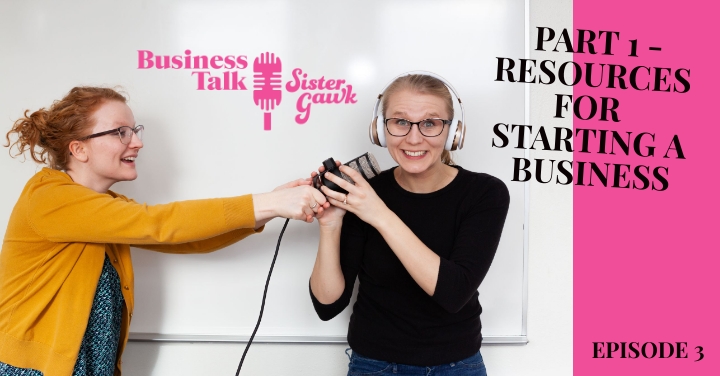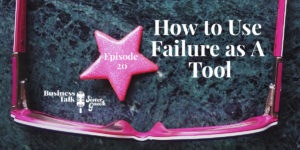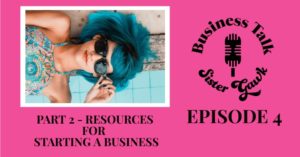In this episode, we will be focusing on part one of our four part series diving into business development tools and resources to start up a business at very low cost. You can find all of the links mentioned in this episode within the Tools & Tips page of our website, because we know that when you are working out or you’re on the go, you may not be able to jump on this stuff right away. Then later, if you ever need to access to the information, you can find that within the Business Talk Sister Gawk website.
Bekkah: First, we recognize that this isn’t a complete list as we’re always learning more and adding more to this. We’re really excited about adding to our tool box as we talk with entrepreneurs. They always give us really cool things to add.
Ruthie: Things that have benefited them as they started up their businesses.
Business Development and Startup Resources
If you’ve ever thought, “Hey, I really think that this could be a profitable business.” But don’t know where you should you go with that, then we want to help you. That’s what we’re going to talk about in this four part series.
Ruthie: Where do you even start? Bekkah, tell us about the Small Business Administration and what it can do for you!
Bekkah: Oh my goodness! Okay! So if you haven’t heard of the Small Business Administration, also called the SBA, it’s the government department that works with small businesses. They get paid to do this job and they work in… this is actually a federal government resource. There are local programs housed within different economic development authorities and stuff like that, but the Small Business Administration is on the federal level and covers the entire United States. The SBA has representatives in many different regions of the United States. Your local representative might cover a couple counties in your state, they might just specifically cover your one county, or they may even be exclusive to your city if you live in a big metropolitan area. These people are paid to council you about your business ideas and profitability. They’re basically like a free business consultant!
Ruthie: So are these people… are they like dream killers or do they actually get paid to watch you succeed?
Bekkah: Great question! This is probably going to depend a little on the person that you’re working with and what you come to them with. I think that one of the things you need to be aware of is that they see a lot of people who come through and just are visionaries with no real ideas for execution. These people are really excited about, “Oh! I had this idea for profitability.” And I mean you have… Ruthie had an excellent idea to make jewelry out of –
Ruthie: Chicken nugget bracelet! We were talking about this. They’re like candy bracelets, but they’re made out of chicken nuggets.
Bekkah: Yeah.
Ruthie: And you can eat it! I made a prototype it was awesome.
Bekkah: And very stylish in the Fred Flintstone style.
Ruthie: I wouldn’t say… yeah…
Bekkah: It was definitely like something Wilma might have worn.
Ruthie: Probably. I wouldn’t doubt it.
Bekkah: Some really big big rock pearls out of chicken nuggets. Yeah so anyways, Ruthie actually did pitch that to a business counselor once.
Ruthie: I was kind of half joking, half dead-on serious. I really did want to pursue it but then she started talking about all the food processing regulations and I realized that might not be exactly where my gift is in.
Bekkah: Ruthie does not like food inspection regulations. Because you’ve probably seen those candy bracelets you get that she wanted to basically make a candy bracelet/necklace out of chicken nuggets.
Ruthie: Oh yeah, they know. It’s obvious what I was going for!
Bekkah: Yeah, but as soon as the lady said that you’re going to have to have clear instructions about not cooking these in the oven and then directly placing them around your neck, that’s when we realized, “yeah, this is probably…”
Ruthie: There are a lot of stupid people in the world and I don’t want to deal with that.
Bekkah: The liability on that is a little high if you don’t have clear packaging, but it definitely could still be a profitable
business. She was very gracious with us and said –
Ruthie: Yeah so that was the point. She was very gracious. She didn’t just come out and say, “No, this is a stupid idea.” Instead she walked me through what production would look like. So when my thinking was, “Wow this would be really fun!,” she just responded with, “Okay, here’s the things that wouldn’t be fun” or “Here’s the reality of what you are trying to do.” Basically, “You could do it but it would take a lot of work.” And she knows enough about business and production and those things, that she was able to tell me exactly what would need to be done to get that off the ground.
Bekkah: Exactly, and when we’re thinking about the the minute number of people within one region that are really going to buy that product, you’d really have to go to digital sales. And that is so many more hoops to jump through, specifically just in food packaging.
Ruthie: Not saying that it can’t be done! It was just not what I wanted to do long term. If that is something that you’re
interested in, it’s on the table and I would love to see chicken nugget bracelets on the market someday!
Bekkah: I’m pretty sure she would buy those and flaunt them.
Ruthie: I would!
Ruthie: I would buy them in bulk and I would give them to all of my friends.
Bekkah: So like if you actually do that, don’t tell her because she’s going to give them to me for Christmas.
Ruthie: I’ll go broke! Just kidding.
Bekkah: And yeah, oh yeah, sometime we should tell them about our horrible Christmas present tradition.
Bekkah: So that’s the first resource we wanted to share with you – Small Business Administration. Setting up a meeting with them is absolutely free. Do it! They are really good at helping you break down what it’s going to take for your vision to become reality.
University Extension Offices for Helping Your Business
Bekkah: So most states have a State University. Universities pride themselves in being the most advanced education system. How do they do that? Through research! They always love when they can say, “We invented the vaccine for whatever,” or that kind of stuff. They get really excited about it. Turns out those people are excellent people to talk to you when you’re looking at a specific industry that you want to break into. Some industries might be: farming (or agriculture in general), or manufacturing – they have tons of resources and tons of connections across different states even.
These are really good people to work with, especially, when you’re thinking, “Hey, this is a product I want to
process locally. What’s the consumption of that and how can I tap into that?” Universities have access to free software that probably wouldn’t run on your computer because it’s too data-rich. A lot of of different processing needs ram power to work. Since they have many resources that they’re already using and they love that kind of stuff, it’s great to connect with them. Sometimes they may even ask you to do a real-world application of a theory they’ve been testing. And if your business is already up and running and you want to test out something they’ve been working on to be a part of a research study, they’d love that, too.
Ruthie: And sometimes you can be compensated for being a part of their research studies.
Bekkah: Yeah, sometimes it’s only like five bucks for filling out a survey but it’s better than nothing, right? So that’s exciting.
Help Being Financially Ready to Start A Business: Dave Ramsey
Bekkah: If you’re thinking, “Hey, I want to start a business but I need to
make sure that I am financially stable enough to do that,” then you should check out Dave Ramsey. What we like about Dave Ramsey is that we both have tried his techniques and have found them very useful. This is especially true for the debt payoff process. He’s really big on that one.
Ruthie: The debt snowball process and his Seven Baby Steps were what really got me hooked. Watching Bekkah and her husband, Joel, walk through the process of their debt snowball journey and seeing them actually applying the principles of Dave Ramsey was really an eye-opener. What’s cool about that is that is that his principles are rooted in the Bible and Biblical principles. Another thing that’s cool about him is that he is very vocal about sharing the Gospel and that’s something that I think is really important. Anyway so he is… if you don’t know who he is you should look him up.
Bekkah: He has the number four podcast in the world so that’s another good podcast to listen to.
Ruthie: He has another program called Financial Peace University. If your church is leading that then you should definitely get involved or try to look for one in your area.
Bekkah: So in general, I think the biggest thing the takeaway about the concept about meeting your financial goals is that you’re going to be able to do a whole lot more when you have a limited amount of risk. Meaning: if you don’t have any debt, it’s not a huge risk to try something new. And that’s what I like. I like low risk opportunities.
Getting Mentally Prepared to Run A Business Well – Christie Wright
Bekkah: We like Christy Wright because she’s specifically geared toward female entrepreneurs. She has a book called Business Boutique that you probably could find and read at the library for free. We definitely recommend checking it out if you can . I have a couple friends that have been looking at her stuff and reading her books and what they really like about it is that it boosts your confidence and tackles difficult issues in a practical way like: “How do I price myself?,” “How do I ask for money?,” and “Should I be giving away my services for free?”
She really nails those questions and hits on a whole bunch of myths about how you should start your business. There’s gonna be a ton of people out there that are going to say things like, “Hey, we’re gonna give you free branding if you do this for free for us!” Going with that can actually end up being a really poor decision in the long run because you’re not valuing your product or your service the way it should be, and you’re getting really high maintenance clients. There’s also a lot more to what she does. I would definitely recommend giving her a listen on her podcast
Ruthie: Which is also called “Business Boutique.”
How to Utilize Facebook Business Groups
Bekkah: So Facebook has been really really pushing their groups, communities, right? I don’t know if you guys have
been looking at the news at all, but Facebook had been totally getting slammed for all of these hate things that people are posting, and for negative ads or political things. So now they have to be like, “Whoa, whoa, whoa, we are turning into a Content platform, we’re now becoming curators,” and that’s actually moving them away from the legal status of being a, basically, just a place for people to post their thoughts. Now the problem is, “Oh we’re gonna get nailed by the government.” Bottom line, they’re now trying to transform how they’re doing things into pushing groups with group moderators. This is very similar to Reddit, if you guys have ever used Reddit. Reddit is definitely a little bit more techie and not as visually appealing or user-friendly, but it’s a really good place to find snarky fun content… sometimes. Other times, it’s like somebody’s totally roasting you.
So with that Facebook is thinking, “Whoa, there’s way less liability in Reddit’s model so let’s push Facebook groups.” Within that, there are business groups that you can ask to be a part of. Now what’s really nice about those entrepreneurial groups is that they have a code of conduct for what you’re allowed to post and not allowed to post, and you have to agree to act in accordance to those standards. You might even be asked to prove that you have a business right now or you’re looking to start one. After that, you can get invited to that group or be accepted when you request to join.
That’s a really good place to start getting some small data on different demographics, so if you’re doing different things like, “Oh I really want to know if this book cover that I’ve been working on is gonna do well versus this one,” or “Should I be reaching this group of people or this group of people?” Putting those questions to the group is really fun because there’s a ton of people in there that’ll be like, “Oh, yeah, I totally buy that.”
I just recently saw someone post: “Hey, would there be people out there that would buy subscription service to place settings? If I put all of the plates together and mailed them to you, would you be happy with those?” A ton of caterers would chime in and say, “Absolutely! That’s such a storage issue for me and I’m always doing different events that have different color combinations. If I could just go to a subscription to get all the stuff, clean it, and send it back, that would be so much easier for me!” So Facebook groups are definitely a really good place to get quick consumer feedback from other business owners. Additionally, sometimes when I want to get a second opinion about something that I’m seeing in my data and I’ll say, “Hey, guys, I’ve been looking at this. Do you see this happening in the marketplace?” It’s a really good place to poll a ton of people really quickly about what they’re seeing within the environment of economics or whatever else. It can also be a good place to just affirm whether or not you should pursue a certain direction. The downside of these groups is that sometimes they’ll post stuff about multi-level marketing and they try to
convince you to become a representative.
Ruthie: Part of their pyramid scheme!
Bekkah: Yeah so watch out for that. The other thing to watch out for is people that are like boasting get-rich-quick schemes that clearly look sketchy.
Ruthie: Basically, if it sounds too good to be true, it probably is. So stay away from it.
Bekkah: Yeah and, let me tell you, it’s a rabbit hole of a journey to try to figure out what these people are actually talking about. The other thing that I see very often in these groups – and maybe you need to be this person, I’m not saying you shouldn’t be – I’m just saying that I find it a little bit emotional sometimes. When people post in the groups and say things like, “Oh my goodness! This is the worst thing that ever happened to me and buh bah bah bah,” followed by 2,000 people commenting sympathetically, “Oh! I feel you! You need to dump that guy!” or whatever. That happens.
Ruthie: Sometimes, you just need to be validated I guess.
Bekkah: Yeah and I usually see that happening in groups like the women’s entrepreneur, but I think it’s kind of funny. Anyways! So, definitely an entertaining place to learn stuff, get a good feel for different demographics of people, and that kind of stuff. I generally find the group setting very valuable.
Ruthie: It’s worth the time investment to look through some options. There are so many different types of Facebook business groups, you can just look and you’ll probably find one that’s in your niche market, honestly. There’s just so many of them.
Using The Free Mentorship Opportunities within LinkedIn
Bekkah: The other thing we’re going be talking about for you to potentially utilize, if you are a younger person thinking, “Hey! I really want to try different things!” There is this amazing new tool on LinkedIn called “LinkedIn Career Advice.” This is a tool that you actually can sign up for it and it’ll ask you “What are you interested in learning about?” and give you categories to fill out. Then they will send you your algorithm matches of people that they think you should connect with.
I have totally done this multiple times and it’s actually been a really valuable experience for me because, first of all, half the people that agreed to be a LinkedIn mentor forgot that they agreed to it, so that tends to be a really awkward conversation. Like “Thanks so much for agreeing to meet with me!” and they’re like, “Uh, I did? Who are you?” so then you just have to explain, “Yeah, you know, we were matched together based on the mentorship algorithm within LinkedIn. This is what I’m looking to learn. Would you be interested in having a phone call with me?”
It’s been fun to literally talk to people from across the United States and just connect with them and say, “Hey, what are you doing here? This is what I’m thinking about doing. What do you think of that?” I’ve even had other marketers that’ll say, “Okay! I looked at your website. This is what I would recommend,” “I’m looking at what you’re doing and I think you’re doing really good here, keep trying here!,” or they’ll just validate some of the stuff that I’ve been working on. That has been so beneficial, so definitely check that out. If you don’t have a LinkedIn account, you should absolutely set one up. And always save your password because, from experience, if you don’t, you actually have to send in a picture of your driver’s license to get it validated again. They take your security seriously, which I appreciate, because that’s a really professional platform and if someone hacked that it’d be pretty awkward. So, definitely save that!
We hope that you enjoyed this episode of Business Talk Sister Gawk and that you find the tips and tools useful in your entrepreneurial endeavors! Thank you for listening and remember that you can find all the information mentioned here in our Tools & Tips page. If you found this information useful and know of someone else who might enjoy the show feel free to share about us in conversation or on social media.
Until next time,
Bekkah & Ruthie




